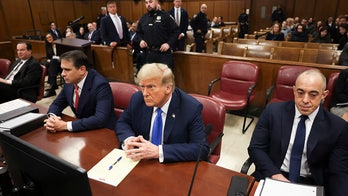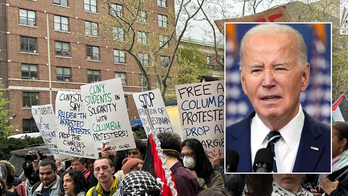Sen. Minority Leader Mitch McConnell, R-Ky., on Monday got out his big brush to paint Supreme Court nominee Elena Kagan in the mold of a Democratic administration whose direction has the country concerned. McConnell, following a circuitous route to the nominee, first ticked off a series of moves by President Obama, "running banks, insurance companies, car companies, and the student loan business," then hit the health care law, which no GOP Senator supported, and the administration's prohibition against insurance companies publishing information to seniors about how their benefits might be affected under the new law.
The senator then made the turn to Kagan and her argument, as Solicitor General, in the controversial Citizens United v. FEC case that some political literature could be banned by the federal government under campaign finance reform legislation, much like the Health and Human Services Agency gagged insurance companies.
McConnell, a longtime foe of the Bipartisan Campaign Reform Act of 2002, which imposed strict regulation of campaign practices, noted in a Senate floor speech that Kagan's office had to argue the case twice, first supporting the idea that books could be banned that mention a candidate's name even once, then modifying that argument when justices bristled at the suggestion.
Kagan, in her office's second appearance before the Court and a personal first, said, "The government's view is that although 441b does cover full-length books . . . the FEC has never applied 441b in that context." Kagan then told the Court, "I think a -- a pamphlet would be different. A pamphlet is pretty classic electioneering, so there is no attempt to say that 441 b only applies to video and not to print."
The Court ruled against Kagan and held that corporations cannot be limited in participating in campaigns, for to do otherwise, would be a violation of their First Amendment rights.
McConnell said in his one-on-one meeting with Kagan last week, "She said she made the argument she did because she had to defend the statute," but McConnell said, "The client doesn't choose the argument, the lawyer does."
In a speech laced with doubt about the nominee, McConnell indicated he had not yet decided how he would vote on Kagan's nomination, though he called the Kagan argument "troubling."
The senator went further, quoting from a Clinton-era policy document in which Kagan, then a domestic policy adviser to that administration, seemed to advocate a wide view of campaign finance regulation.
McConnell read this portion of the document authored by Kagan and five of her colleagues: "It is unfortunately true that almost any meaningful campaign finance reform proposal raises constitutional issues and will provoke legal challenge. This is inevitable in light of the Supreme Court's view -- which we believe to be mistaken in many cases -- that money is speech and that attempts to limit the influence of money on our political system therefore raise First Amendment problems."
McConnell, repeating the word “unfortunately” with credulity, noted that Kagan told Sen. Arlen Specter, D-PA, last week that the Court had been wrong in Citizens United by not being "sufficiently deferential to Congress," a quote Specter relayed to reporters after his private meeting with the nominee.
"But deferred to Congress on what?” McConnell asked. “Deferred to Congress on a statute that is so broad that it encompasses ‘full length books' and 'pamphlets,' as Ms. Kagan put it, and probably to a host of other materials as well? One can only assume that since Ms. Kagan was making these comments in her individual capacity, they provide a more complete picture of her views about the government's ability to restrict political speech," McConnell said.
It is actually unclear in what capacity Kagan was writing in the 1990's document. According to the Center for Competitive Politics, "The memo appears designed to support and explain President Clinton's position on an early version of McCain-Feingold (the bill of campaign finance restrictions Congress ultimately passed in 2002)-it's written in that style and not in an advocacy style. It's still not clear what Elena Kagan really thinks about campaign finance issues."
Congressional Democrats are in the process of writing legislation to counter the Citizens United decision, but in the meantime, it is clear Republicans are preparing for a battle with Kagan on this front.



